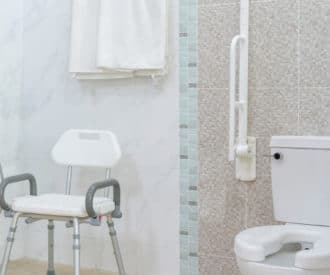
Multi-task during visits
When you visit your parents’ home, it’s the perfect opportunity to take some time to discreetly check for signs that they're still doing well or if they’re starting to need help.
Don’t make it obvious
Remember to keep your detective work under the radar so you don’t risk putting your parents on the defensive or cause them to change their normal behavior.
Your main goal is to quietly observe and take notes. Once you understand the full picture, you can start an informed conversation about changes that need to be made.
Take notes for future reference
File your notes away so you can refer to them in the future. Even if everything is going well right now, having a record of how things were in the past will help you track changes in the future.
Home visit checklist
In general, look for signs of trouble with thinking skills, vision, and physical activity.
Physical and mental health
- Have they lost weight or do they seem more frail?
- Do they have trouble having normal conversations?
- Do you notice any strange new behaviors like repeating stories or being unusually confused about simple things?
- Are they squinting or tripping over things much more than usual?
Getting around
- Are their driving skills the same as before? Do you feel safe when they drive you around?
- Are there any unexplained dents or scratches on the car?
- Have you heard about any traffic tickets?
Social life
- Do they still do the activities they used to enjoy?
- Are they reluctant to leave the house?
- Are they keeping up with their usual friends and community organizations?
The house
- Is the house messier or dirtier than normal?
- Is there a lot of unopened mail? Are unpaid bills lying around?
- Are there broken household items like clogged drains, burned out light bulbs, or broken appliances?
The kitchen
- Is the refrigerator stocked with fresh foods they normally eat?
- Is there moldy or expired food around?
- Are there burned pots and pans or burn marks on the floors or counters?
Medication
- Are there any new medications, vitamins, or supplements you haven’t seen before?
- Is their medication organized so it’s easy to take the correct dose at the correct time?
- Are expired medications mixed up with current ones?
Print this list
We’ve created a PDF version of this list, with actual checkboxes, so you can print it out and take it with you on your visit. Go through the list, check things off and make notes, then file it away so you can look at it in the future if needed.
Next Step Print or save this checklist (PDF)
You might also like:
— How to Talk with Parents About Aging: Conversation Starters
— 4 Tips to Deal with Seniors who Refuse Help
— 4 Simple Bathroom Safety Tips for Seniors
By DailyCaring Editorial Staff
Image: New America Media
About the Author

Connie Chow
Connie was a hands-on caregiver for her grandmother for 20 years. (Grandma made it to 101 years old!) She knows how challenging, overwhelming, and all-consuming caring for an older adult can be. She also knows how important support is — especially in the form of practical solutions, valuable resources, and self-care tips.





A Hospital setting: When someone states they are a primary care giver do they need to have documents stating this.
Each hospital likely has its own rules and regulations around determining who the primary caregiver is. It’s best to speak with the staff at your older adult’s hospital to find out what they require.
What dozes it mean when my mum who is 83.
Keeps telling me she can see people trying to get into her sheds by picking the lock & undoing the screws..
When I go out side there is nobody about..
This is pulling me down..
Does your mom have Alzheimer’s, dementia, or a health condition that causes cognitive issues? It sounds like she may be having hallucinations.
If she isn’t already diagnosed, it’s a good idea to have her doctor give a thorough exam to rule out treatable health conditions that could be causing this behavior. Even something as simple as a urinary tract infection could cause cognitive symptoms.
If it is dementia, this article might help you understand hallucinations and know how to respond: 10 Ways to Respond to Dementia Hallucinations in Seniors https://dailycaring.com/10-ways-to-respond-to-dementia-hallucinations-in-seniors/